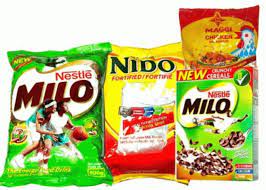By Jeph Ajobaju, Chief Copy Editor
Nestle, the world’s largest food and beverage company, says higher commodity and transportations costs have compelled it to introduce bigger price hikes, which will affect its products in Nigeria such as Maggi Cube, Milo, and Nescafe.
Nestle produces more than seven million Maggi Cubes per day in Nigeria alone, testament to the popularity and market reach of the food seasoning in Africa’s largest economy.
Its announcement piles up pressure on food prices in Nigeria where Islamist jihadist in the North prevent farmers from cultivating crops and add to scarcity and price hikes of staple foods, stoking multiplier effects in all social and economic sectors.
Ice cream, coffee, cereal
Nestlé, which sells everything from ice cream to coffee and cereal, said it would respond to higher input costs by raising prices in the second half of the year (H1 2021).
“Inflation has been virtually absent for a number of years and then pointed up very sharply. It hit us directly,” CEO Mark Schneider told reporters on a conference call reported by CNN.
Schneider said he believes that inflation is transitory.
But the owner of brands including Nescafe, Gerber and Cheerios said it would need to raise prices by roughly 2 per cent to offset cost increases of 4 per cent. Nestlé hiked prices by 1.3 per cent in H1 2021.
The company can hedge against some cost increases, such as rising coffee prices, said Schneider. But it can’t avoid the rising cost of things like transportation, which puts pressure on the company’s margins.
Nestlé (NSRGF) said it expects a profit margin this year of 17.5 per cent, a slight downgrade that partially reflects “time delays between input cost inflation and pricing.”
Despite that, the company raised its sales growth outlook for 2021 to between 5 per cent and 6 per cent.
CNN adds that companies from General Electric (GE) to Anheuser-Busch InBev (BUD) and Unilever (UL) have warned in recent weeks about rising input costs as the global economy recovers from the coronavirus pandemic.
Demand for some products has increased sharply as people resume travel and return to the office, and global supply chains remain stretched.
Passing on cost increases to consumers
Some companies are able to hedge against rising prices, for example by buying commodity futures, or choose to absorb higher costs.
But others are passing on cost increases to consumers, leading to higher prices at supermarkets, restaurants and goods retailers.
Nestlé rival Unilever said in July that it was increasing prices across multiple markets and product categories in response to higher input costs.
The owner of brands including Ben & Jerry’s cited the example of soybean oil prices, which increased 20 per cent last quarter and are now up 80 per cent compared to the previous year. Palm oil prices are 70 per cent higher than their long-term average.
“Inflation is impacting us across the full spectrum of input costs in materials, in packaging and quite notably in freight and distribution costs,” Unilever chief financial officer Graeme Pitkethly told investors on July 22.
“We have been and will continue to pull all the levers of pricing and saving.”
The big question is whether shortages and price hikes are temporary byproducts of the pandemic, or if the global economy is changing in ways that could permanently hike the cost of doing business and usher in a new era of inflation that could eat into consumer spending power.
Central banks including the US Federal Reserve are grappling with how to respond.
Many economists believe that price hikes will prove fleeting, but if they’re wrong central banks could be forced to abruptly pull back support for the economy later this year in order to get inflation under control.







![[UPDATED] Catholic priest arrested by police for alleged shooting, killing boy over New Year fireworks [UPDATED] Catholic priest](https://thenicheng.com/wp-content/uploads/2025/01/du-ty-100x70.png)





